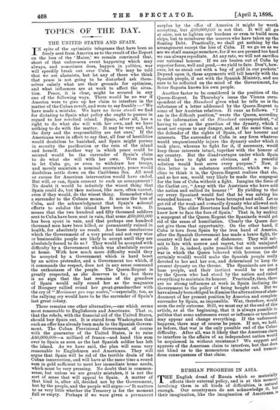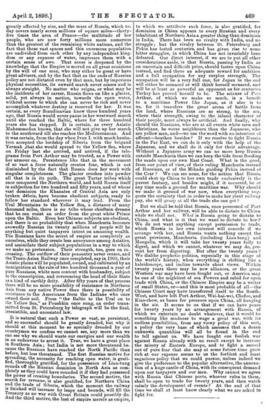RUSSIAN PROGRESS IN ASIA. T HE English dread of Russia which
so materially affects their external policy, and is at this moment involving them in all kinds of difficulties, is natural enough. Our countrymen do not acknowledge it, but their imagination, like the imagination of American& iS greatly affected by size, and the mass of Russia, which to- day covers nearly seven millions of square miles—thirty- five times the area of France—the multitude of her people, who are now forty millions more numerous than the greatest of the remaining white nations, and the fact that these vast spaces and this enormous population are undivided from each other by any independent king- dom or any expanse of water, impresses them with a certain senile of awe. That sense is deepened by the knowledge that the Empire is moved on all great occasions by the will of one man, who may either be great or have great advisers, and by the fact that as the ends of Russian policy are not dictated even by that man, but by imperious physical necessities, its onward march never ceases and is always straight. No matter who reigns, or what may be the incidents of her career, Russia flows on like a glacier, solid, yet always in motion, towards the open water, without access to which she can never be rich and never accomplish whatever destiny is reserved for her. It was certain, as every Scandinavian knew three hundred years ago, that Russia would never pause in her westward march until she reached the Baltic, where for three hundred years she has stopped. It is certain, as every Asiatic Mahommedan knows, that she will not give up her march to the southward till she reaches the Mediterranean. And it was certain, from the day when Ivan I. with much hesita- tion accepted the lordship of Siberia from the brigand Yermak ,that she would spread to the Yellow Sea, where on Friday last she arrived, and arrived, if the tele- grams from Port Arthur may be trusted, as a Power with her armour on. Persistence like that in the movement of so vast a force naturally creates fear, which is not diminished by the fact that Russia does her work with singular completeness. The glacier crushes into powder all that is in its path. The great Tartar tribes which once conquered the Northern world, and held Russia itself in subjection for two hundred and fifty years, and of whose vast dominion the Ilhanates of Central Asia are only broken &brie, have become obedient subjects, ready to follow her standard wherever it may lead. From the Ural Mountains to the Yellow Sea, a distance of many thousand miles, there is no tribe whose chieftain dreams that he can resist an order from the great white Prince upon the Baltic. Even her Chinese subjects are obedient, and there is no probability that when Manchuria becomes avowedly Russian its twenty millions of people will be anything but quiet taxpayers intent on amassing wealth. The Russians have the secret of empire as completely as ourselves, while they create less annoyance among Asiatics, and assimilate their subject populations in a way to which we make no pretension. Their strength, too, goes on in- creasing. The outflow of their peasantry never ceases, and the Trans-Asian Railway once completed, say in 1905, their Asiatic plains will be populated, owned, and cultivated by an immigration at the rate of two hundred thousand a year of pure Russians, white men content with husbandry, subject to the conscription, and reverencing the head of their State as a kind of earthly deity. After fifty years of that process there will be no more possibility of resistance in Northern Asia from any native Power than there is possibility of resistance to the Americans from the Indians who once owned their soil. From "the Baltic to the Ural on to the Yellow Sea," as Poushkin once sung, an order trans- mitted from St. Petersburg by telegraph will be the final, irresistible, and unresisted law.
It is natural that such a Power so vast, so persistent, and so successful should be greatly dreaded, but why it should at this moment be so specially dreaded by our countrymen we confess we cannot see, any more than we can see why we should waste our energies and our wealth in an endeavour to arrest it. True, we have a great place in Southern Asia ; but India is not more threatened be- cause the Russians have reached the North Pacific than before,. but less threatened. The first Russian motive for spreading, the necessity for reaching open water, is grati- fied, thoroughly gratified, for the possession of Liau-tung rounds off the Russian dominion in North Asia as com- pletely as they could have rounded it if they had possessed the power of creating boundaries. The second motive, the search for revenue, is also gratified, for Northern China and the trade of Siberia, which the moment the railway is finished will increase by leaps and bounds, will fill the Treasury as no war with Great Britain could possibly do. And the third motive, the lust of empire merely as empire, to which we attribute such force, is also gratified, for dominion in China appears to every Russian and every inhabitant of Northern Asia a greater thing than dominion in India. There has been no rivalry with India, and no struggle ; but the rivalry between St. Petersburg and Pekin has lasted centuries, and has given rise to some bitter struggles, in which China has not invariably been defeated. Our direct interest, if we are to put all other considerations aside, is that Russia, passing by India as an uncertain and difficult prize, should fasten upon China instead, and find there an adequate reward for ambition and a full occupation for any surplus strength. The occupation will be a very full one, for Japan in the end will either be menaced or will think herself menaced, and will be at least as powerful an opponent as for centuries Turkey has proved herself to be. The seizure of Port Arthur, of which we make so much, is a benefit to a maritime Power like Japan, as it also is to us, for it transfers the great arena of battle from the land, where Russians are so strong, to the sea, where their strength, owing to the inland character of their people, must always be artificial. And finally, why should the Russians, who are at all events white men and Christians, be worse neighbours than the Japanese, who are yellow men, and—we use the word with no intention of affront—heathen besides ? If we resolve to fight Russia in the Far East, we can do it only with the help of the Japanese, and we shall do it only for their advantage. Without a Japanese army we can no more keep Russia outside Manchuria than we can keep the tide from flooding the sands upon our own East Coast. What is the good, from our point of view, of their ruling Manchuria instead of Russians, or of the Mikado guiding Pekin instead of the Czar ? We can see none, for the notion that Russia could shut up China to her own trade exclusively is the purest fantasy, and besides might, if it occurred, be at any time made a ground for maritime war. Why should we make it ground of war now, when everything sug- gests the certainty that in order to make her giant railway pay, she will grasp at all the trade she can get ?
But we shall be told that Russia, once possessed of Port Arthur and her railway, will be able to dictate to China while we shall not. What is Russia going to dictate to China, and what is it that we want to dictate to her ? We do not want anything except permission to trade, which Russia in her own interest will concede if we arrange with her, and Russia wants nothing except the great provinces, Manchuria (including Liau-tung) and Mongolia, which it will take her twenty years fully to digest, and which we cannot, whatever we may do, pre- vent her from digesting. But after the twenty years ? We dislike prophetic politics, especially in this stage of the world's history, when everything is shifting like a. kaleidoscope, and incline towards short views. Within twenty years there may be new alliances, or the great Western war may have been fought out, or America may be one of the mightiest of sea Powers and rabid for open trade with China, or the Chinese Empire may be a welter of small States, or—and this is most probable of all—the Chinese Court may have transferred itself to the South- West, and have left Port Arthur, Wei-hai-wei, Chefoo, and Siao-chow, as bases for pressure upon China, all hanging in the air. It seems to us that if we can have peace for twenty years by an arrangement with Russia, of which we entertain no doubt whatever, that it would be something like madness to wage a great war, with its endless possibilities, from any viewy policy of this sort, a policy the very base of which assumes that a dozen unknown quantities will all be found in the end to tell against us. We have fought one foolish war against Russia already with no result except to increase the misery of Eastern Europe, and to fight a second out of pure fear that she may at some future time grow rich at our expense seems to us the feeblest and least sagacious policy that we could pursue, unless indeed we give the preference to the popular alternative, the annexa- tion of a huge cantle of China, with its consequent demand upon our taxpayers and our men. Why cannot we agree with Russia that Chinese ports, whoever rules in them, shall be open to trade for twenty years, and then watch calmly the development of events ? At the end of that time we shall at least know clearly what we are asked to fight for.



































 Previous page
Previous page